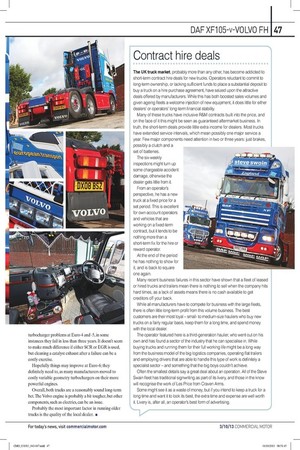Contract hire deals
Page 39

If you've noticed an error in this article please click here to report it so we can fix it.
The UK truck market, probably more than any other, has become addicted to short-term contract hire deals for new trucks. Operators reluctant to commit to long-term ownership, or lacking sufficient funds to place a substantial deposit to buy a truck on a hire purchase agreement, have seized upon the attractive deals offered by manufacturers. While this has both boosted sales volumes and given ageing fleets a welcome injection of new equipment, it does little for either dealers' or operators' long-term financial stability. Many of these trucks have inclusive R&M contracts built into the price, and on the face of it this might be seen as guaranteed aftermarket business. In truth, the short-term deals provide little extra income for dealers. Most trucks have extended service intervals, which mean possibly one major service a year. Few major components need attention in two or three years: just brakes, possibly a clutch and a
set of batteries.
The six-weekly inspections might turn up some chargeable accident damage, otherwise the dealer gets little from it.
From an operator's perspective, he has a new truck at a fixed price for a set period. This is excellent for own-account operators and vehicles that are working on a fixed-term contract, but it tends to be nothing more than a short-term fix for the hire or reward operator.
At the end of the period he has nothing to show for it, and is back to square one again.
Many recent business failures in this sector have shown that a fleet of leased or hired trucks and trailers mean there is nothing to sell when the company hits hard times, as a lack of assets means there is no cash available to get creditors off your back.
While all manufacturers have to compete for business with the large fleets, there is often little long-term profit from this volume business. The best customers are their most loyal — smallto medium-size hauliers who buy new trucks on a fairly regular basis, keep them for a long time, and spend money with the local dealer.
The operator featured here is a third-generation haulier, who went out on his own and has found a sector of the industry that he can specialise in. While buying trucks and running them for their full working life might be a long way from the business model of the big logistics companies, operating flat trailers and employing drivers that are able to handle this type of work is definitely a specialist sector — and something that the big boys couldn't achieve.
Often the smallest details say a great deal about an operation. All of the Steve Swain fleet has traditional signwriting as part of its livery, and those in the know will recognise the work of Les Price from Craven Arms.
Some might see it as a waste of money, but if you intend to keep a truck for a long time and want it to look its best, the extra time and expense are well worth it. Livery is, after all, an operator's best form of advertising.











































